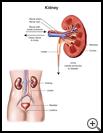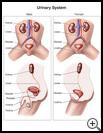
Kidney Stones (Renal Calculi) Discharge Information
What are kidney stones (renal calculi)?
Kidney stones, also called renal calculi, are solid pieces of material that form in the kidneys from substances in the urine. Stones can occur in any part of the urinary system from the kidneys to the bladder. They may be small or large. You may have just one stone or many.
There are different types of kidney stones:
- Calcium stones: Most kidney stones are calcium stones. Many people have calcium stones from too much of a chemical called oxalate in their diet. Oxalate is in many foods, such as spinach, rhubarb, leafy vegetables, coffee, chocolate, and tomatoes. You may also get calcium stones when there is too much calcium in your urine. This may happen when your kidneys don't work properly or your stomach and intestines absorb too much calcium.
- Uric acid stones: Uric acid stones happen when you have too much uric acid in your urine. This might happen when your body does not have enough fluid, such as when you exercise on a hot day or during an illness and you don’t drink enough fluids.
- Struvite stones: This type of stone is also called an infection stone because it forms in urine that is infected with bacteria.
- Cystine stones. This type of kidney stone is rare. It happens if you have a genetic disease called cystinuria. This disease results from a birth defect that causes the kidney to let too much cystine into the urine.
How can I take care of myself when I go home?
How long it takes to get better depends on the type of stone you have and the type of treatment you need. You may need to make some diet changes to prevent future kidney stones.
Management
Your provider will give you a list of your medicines when you leave the hospital.
- Know your medicines. Know what they look like, how much you are to take each time, how often you are to take them, and why you take each one.
- Take your medicines exactly as your provider tells you to.
- Carry a list of your medicines in your wallet or purse. Include any nonprescription medicines and supplements on the list.
- Talk to your provider before you use any other medicines, including nonprescription medicines.
- Your provider may prescribe medicine to:
- Treat pain
- Treat or prevent an infection
- Reduce swelling in the urinary tract
- Prevent nausea
- Prevent more stones from developing
- Your provider may recommend other types of therapy to help relieve pain, other symptoms, or side effects of treatment.
- Your healthcare provider may recommend that you drink larger quantities of fluids to help you pass kidney stones and change your diet to help prevent future stones.
- You may be asked to collect and strain your urine. This will allow your provider to check the size and type of stones that you have.
- Follow activity restrictions, such as not driving or operating machinery, as recommended by your healthcare provider or pharmacist, especially if you are taking pain medicines.
- Ask your healthcare provider if there are any foods or medicines you should avoid.
- Drink enough fluids to keep your urine light yellow in color, unless you are told to limit fluids.
- Get plenty of rest while you’re recovering. Try to get at least 7 to 9 hours of sleep each night.
Appointments
- Follow your provider's instructions for follow-up appointments.
- Keep appointments for any testing you may need.
Talk with your provider about any questions or concerns you have.
Call your healthcare provider if you have new or worsening:
- Back pain
- Belly pain
- Burning with urination
- Blood in your urine
- Passing gravel-like or sand-like stones in your urine
- Nausea or vomiting
- Signs of infection around your surgical wound if you had surgery. These include:
- The area around your wound is more red or painful
- The wound area is very warm to touch
- You have blood, pus, or other fluid coming from your wound area
- You have chills or muscle aches
- Fever higher than 101.5° F (38.6° C)
Developed by RelayHealth.
Acute Care Advisor 2016.4 published by RelayHealth.
Last modified: 2015-04-15
Last reviewed: 2015-12-21
Last modified: 2015-04-15
Last reviewed: 2015-12-21
This content is reviewed periodically and is subject to change as new health information becomes available. The information is intended to inform and educate and is not a replacement for medical evaluation, advice, diagnosis or treatment by a healthcare professional.
Copyright © 2016 RelayHealth, a division of McKesson Technologies Inc. All rights reserved.


